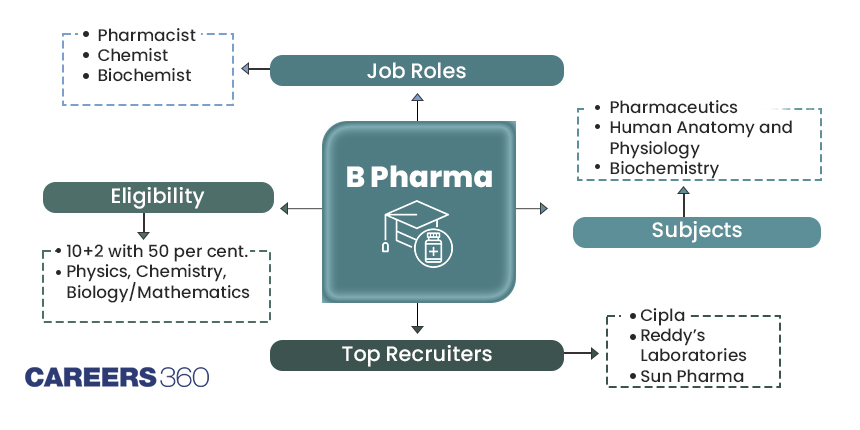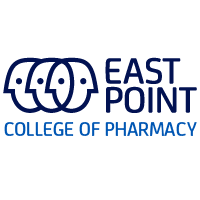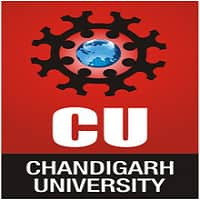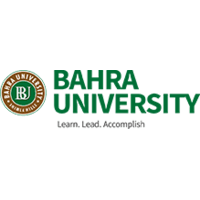MAHE Manipal BPharma & PharmD 2025
MAHE Ranked No. 1 Private University in India by QS World | #4 in India by NIRF 2024
B Pharma or Bachelor of Pharmacy is an undergraduate degree programme in the field of pharmacy. B Pharma course duration is four years which is divided into eight semesters, two semesters in each year. Bachelor of Pharmacy is the study of pharmaceutical science subjects such as drug safety, discovery, medical chemistry, industrial pharmacy, and several other subjects.

Individuals who are interested in becoming pharmacists and want to know how various medicinal drugs affect the human body can opt for the B Pharma course. This bachelor's degree in pharmacy course provides knowledge on drug synthesis, and analysing the benefits and side effects of the drugs. B Pharma also provides a comprehensive understanding of the manufacturing and marketing of the drugs. In this article, we will discuss B Pharmacy course details, such as B Pharma full form, B Pharmacy fees, B Pharmacy syllabus, B Pharma duration, B Pharmacy eligibility criteria.
B Pharma full form is Bachelor of Pharmacy, which is an undergraduate degree programme. B Pharmacy or a bachelor of pharmacy course is the bachelor's degree programme and can be pursued after completing 10+2 in the Science stream. Students gain a comprehensive knowledge of pharmacy and healthcare, and the B Pharma course duration is four years.
| Course Name | Bachelor of Pharmacy |
|---|---|
Abbreviation | B. Pharma |
Type | Degree |
Level | Undergraduate |
Field | Healthcare |
Eligibility | 10+2 with Physics, Chemistry, and Biology/Mathematics |
Course Duration | 4 years |
Average Fee | Rs. 50,000 to Rs. 22,00,000 |
Average Salary | Rs. 5 LPA |
Career Opportunities | Pharmacist, Chemist, Biochemist |
Top Recruiters | Cipla, Reddy’s Laboratories, Lupin, Sun Pharmaceutical Ltd, Aurobindo Pharma., Zydus Cadila, Torrent Pharmaceuticals, Glenmark Pharmaceuticals, Novartis, Intas Pharma, Ranbaxy, Pfizer, GlaxoSmithKline, Johnson & Johnson |
B Pharma or B Pharmacy fees vary depending on the B Pharma course duration, and type of academic institution, such as private and government. Before taking admission to the B Pharmacy course students need to check the B Pharma fees of any particular college in which they want to take admission. The average B Pharmacy fees range from Rs. 50,000 to Rs. 22,00,000.
When it comes to the scope of B. Pharma., there are plenty of opportunities for students of Bachelor of Pharmacy. B Pharma provides the knowledge of what allopathic medicines to use and where to use them. The candidate acquires knowledge about the uses of medicinal plants. Pursuing B.Pharma. helps in acquiring a licence to dispense allopathic medicines which makes him or her a registered Pharmacist.
B Pharmacy eligibility criteria can be defined as a set of parameters that are required to be fulfilled by the candidates in order to be eligible for a particular course. Students who are interested in pursuing a B Pharmacy course have to meet the B Pharmacy eligibility criteria mentioned below:
Candidates who want to pursue a B Pharma degree programme should have a unique skill set, including time management and patience. Below, we have mentioned the skill sets that the students should possess for pursuing a B Pharma course.
Communication skills | Good in ethics |
Reading skills | Analytical mind |
Monitoring skills | Mathematical skill |
Managerial skill | Accuracy |
Leadership quality | Multitasking |
Students who are interested in gaining admission to B. Pharmacy must complete 10+2 and qualify for the entrance examination. Students can either appear for a national-level entrance examination for B. Pharma. or various other state-level entrance examinations such as TS EAMCET, AP EAMCET, BCECE, and WBJEE among others.
GITAM GAT: Gandhi Institute of Technology and Management Admission Test or GITAM GAT is a university-level entrance examination conducted by GITAM Deemed University for admission in pharmacy courses. GITAM GAT is conducted seven times a year in online mode.
WBJEE: West Bengal Joint Entrance Examination or WBJEE is a state-level entrance examination conducted by the West Bengal Joint Entrance Examinations Board for admission into engineering and pharmacy courses at the undergraduate level. WBJEE is conducted once a year on the online mode.
For admission to the Bachelor of Pharmacy or B Pharmacy degree programme in various colleges in India, the B Pharmacy cut-off is a necessary factor. Some colleges offer admission in B Pharmacy courses based on merit and some colleges conduct entrance examinations. Entrance examination score is also considered by many colleges for admission to B Pharmacy courses.
B. Pharma (Bachelor of Pharmacy) course is a four-year-long degree programme, which is divided into eight semesters. B Pharmacy syllabus is similar for almost every college but the curriculum might vary depending on the college. Below, we have mentioned the B Pharmacy syllabus recommended by the Pharmacy Council of India.
Semester 1 | |
Human Anatomy and Physiology I– Theory | Pharmaceutical Analysis I – Theory |
Pharmaceutics I – Theory | Pharmaceutical Inorganic Chemistry – Theory |
Communication skills – Theory | Remedial Biology/Remedial Mathematics – Theory |
Human Anatomy and Physiology – Practical | Pharmaceutical Analysis I – Practical |
Pharmaceutics I – Practical | Pharmaceutical Inorganic Chemistry – Practical |
Communication skills – Practical | Remedial Biology – Practical |
Semester 2 | |
Human Anatomy and Physiology II – Theory | Pharmaceutical Organic Chemistry I – Theory |
Biochemistry – Theory | Pathophysiology – Theory |
Computer Applications in Pharmacy – Theory | Environmental Sciences – Theory |
Human Anatomy and Physiology II –Practical | Pharmaceutical Organic Chemistry I– Practical |
Biochemistry – Practical | Computer Applications in Pharmacy – Practical |
Semester 3 | |
Pharmaceutical Organic Chemistry II – Theory | Physical Pharmaceutics I – Theory |
Pharmaceutical Microbiology – Theory | Pharmaceutical Engineering – Theory |
Pharmaceutical Organic Chemistry II – Practical | Physical Pharmaceutics I – Practical |
Pharmaceutical Microbiology – Practical | Pharmaceutical Engineering –Practical |
Semester 4 | |
Pharmaceutical Organic Chemistry III– Theory | Medicinal Chemistry I – Theory |
Physical Pharmaceutics II – Theory | Pharmacology I – Theory |
Pharmacognosy and Phytochemistry I– Theory | Medicinal Chemistry I – Practical |
Physical Pharmaceutics II – Practical | Pharmacology I – Practical |
Pharmacognosy and Phytochemistry I – Practical | - |
Semester 5 | |
Medicinal Chemistry II – Theory | Industrial PharmacyI– Theory |
Pharmacology II – Theory | Pharmacognosy and Phytochemistry II– Theory |
Pharmaceutical Jurisprudence – Theory | Industrial PharmacyI – Practical |
Pharmacology II – Practical | Pharmacognosy and Phytochemistry II – Practical |
Semester 6 | |
Medicinal Chemistry III – Theory | Pharmacology III – Theory |
Herbal Drug Technology – Theory | Biopharmaceutics and Pharmacokinetics – Theory |
Pharmaceutical Biotechnology – Theory | Quality Assurance –Theory |
Medicinal Chemistry III – Practical | Pharmacology III – Practical |
Herbal Drug Technology – Practical | - |
Semester 7 | |
Instrumental Methods of Analysis – Theory | Industrial PharmacyII – Theory |
Pharmacy Practice – Theory | Novel Drug Delivery System – Theory |
Instrumental Methods of Analysis – Practical | Practice School |
Semester 8 | |
Biostatistics and Research Methodology | Social and Preventive Pharmacy |
Pharma Marketing Management | Pharmaceutical Regulatory Science |
Pharmacovigilance | Quality Control and Standardisation of Herbals |
Computer-Aided Drug Design | Cell and Molecular Biology |
Cosmetic Science | Experimental Pharmacology |
Advanced Instrumentation Techniques | Dietary Supplements and Nutraceuticals |
Project Work | - |
Also Read:
B. Pharma (Bachelor of Pharmacy) is a four-year-long undergraduate degree programme, that can be pursued after completing 10+2. Below, we have mentioned the specialisation of the B. Pharma (Bachelor of Pharmacy) course, which students can choose while pursuing the B. Pharma course.
After completing B. Pharmacy, there are various options for a student to work in the government sector. Students can apply for the post of drug inspector or pharmacist in the government sector. The salary of a government drug inspector is also quite good. There are various jobs available in the private sector in the form of pharmaceutical marketing, quality control, production, and pharmacists.
Since the pharmacy sector in India is growing, there is a high demand for pharmacists in drug manufacturing companies. People who are interested in pursuing higher education, then they can opt for M. Pharma. Graduates can also pursue Pharm.D (Doctor of Pharmacy) after completing B.Pharmacy.
Other Popular Medical Degrees
Students after pursuing a BPharma (Bachelor of Pharmacy) course, can opt for various job roles. Below, we have mentioned some of the career options available after the B Pharmacy course.
Drug Inspector: Drug inspectors are healthcare professionals who manage the manufacturing process of medicines. They monitor the safety standards, utility, and efficiency of the drugs which have been manufactured before selling it in the market. The primary responsibility of the drug inspectors' is to ensure the quality of the drug.
Health Inspector: Health inspectors are healthcare professionals who investigate different drugs that are harmful for human consumption. They can stop the production of any drugs that might prove harmful for use by human beings. Health inspectors review all the complaints and other health concerns and also take care of whether the expired drugs are not consumed by the patients.
Pharmacist: Pharmacists provide various medicines and drugs that are prescribed by physicians. They provide suggestions on how and when to consume medicine. Pharmacists review the manufactured medicines and also recommend proper medications and other necessary diet plans.
Some of the top recruiters that hire B. Pharma (Bachelor of Pharmacy) graduates are mentioned below:
Cipla | Glenmark Pharmaceuticals |
Reddy’s Laboratories | Novartis |
Lupin | Intas Pharma |
Sun Pharmaceutical Ltd | Ranbaxy |
Aurobindo Pharma. | Pfizer |
Zydus Cadila | GlaxoSmithKline |
Torrent Pharmaceuticals | Johnson & Johnson |
The B Pharmacy salary of the graduates depends upon their experience, skills, and education qualifications. Graduates can earn a handsome salary after pursuing a B Pharma (Bachelor of Pharmacy) degree programme. Below, we have mentioned the B Pharmacy salary:
Job Profiles | Average B Pharmacy Salary (annually) |
|---|---|
Drug Inspector | Rs. 10 LPA |
Health Inspector | Rs. 2.4 LPA |
Pharmacist | Rs. 2.2 LPA |
B Pharmacy graduates will find employment in both the public and private sector organisations. Below we have mentioned some of the employment areas where B Pharma graduates can find employment.
Several private colleges in India offer B Pharm degree programmes. Private B Pharm colleges are significantly more expensive than government B Pharma colleges. We have mentioned below some of the top private B Pharm colleges as well as B Pharmacy fees.
Colleges | Fees |
|---|---|
Rs. 5.28 Lakhs | |
- | |
Rs. 4 Lakhs | |
Rs. 3.91 Lakhs | |
Rs. 4.60 Lakhs | |
Rs. 5.87 Lakhs | |
Rs. 4.10 Lakhs | |
Rs. 4.36 Lakhs | |
Rs. 3.60 Lakhs | |
Rs. 6 Lakhs |
Several government colleges in India offer B Pharm degree courses. Students can pursue B Pharm degree programmes from these government B Pharm colleges at an affordable cost. Government colleges are popular for delivering high academic standards across India. The table below lists some of the best government B Pharm colleges along with B Pharmacy fees.
Colleges | Fees |
|---|---|
Rs. 5.60 Lakhs | |
- | |
Rs. 1.80 Lakhs | |
Rs. 1.18 Lakhs | |
Rs. 1.27 Lakhs | |
Rs. 2 Lakhs | |
Rs. 2.40 Lakhs | |
Rs. 12,450 | |
- | |
- |
Various subjects covered in the B Pharmacy syllabus are Human Anatomy and Physiology, Pharmaceutical Analysis, Pharmaceutics, Pathophysiology, Computer Applications in Pharmacy, Biochemistry, Pharmaceutical Microbiology, Physical Pharmaceutics, Pharmacology, Medicinal Chemistry, Industrial Pharmacy, Quality Assurance, Herbal Drug Technology, Pharmacokinetics, Biopharmaceutics.
The average B Pharmacy salary of a professional is around Rs. 2 lakhs to Rs. 5 lakhs per year. The salary depends on several factors such as the experience of the candidate, educational qualification, profile of the company and whether the individual is working in the private sector or the government sector.
The ‘best field’ depends on what the person wants to achieve in his or her career. For some, it is the monetary aspect while for others it is how much they are contributing to society. If an individual is looking for a high rate of career advancement, then pursuing an MBA after pursuing B. Pharm is the best option. Those who have done their MBA have one of the top salaries in India. They can work in top companies as marketing or sales managers. The other option is to do a PhD and become a researcher or a scientist and bring and new and better products that benefit humanity.
Mathematics is not compulsory in pharmacy, however, in one semester students might be required to study it. The eligibility criteria require the student should have completed his or her 10+2 scoring a minimum of 50 per cent marks with physics, chemistry, biology/mathematics as core subjects.
No, pharmacists cannot become doctors after completing their B. Pham or M. Pharm. Pharmacy is different from medicine. Pharmacists are professionally not equipped to carry a diagnosis, nor they are educated to do that. To become a doctor, the individual will have to go to a medical college and do MBBS.
Application Date:28 April,2025 - 28 April,2025
hi adhil,
yes, you can take private admission in deemed universities, and semi-government universities,by your 12th marks.
hope this helps,
thankyou
Hello,
Several central universities in India offer Bachelor of Pharmacy (B.Pharm) programs. One notable institution is Hemvati Nandan Bahuguna Garhwal University, which provides a B.Pharm course through its Department of Pharmaceutical Sciences.
Additionally, institutions like Jamia Hamdard University and Panjab University are renowned for their pharmacy programs.
hi Bani Anwar,
here are the top central universities that offer bpharm courses;
these are some of the central government universities.
hope this helps,
thankyou.
Hello
Central Universities Offering B.Pharm :
1. Central University of Punjab (CUP), Bathinda – Offers a 4 year B.Pharm program with industrial training and research opportunities.
2. Central University of Haryana (CUH), Mahendergarh – Provides B.Pharm under the School of Interdisciplinary and Applied Sciences.
check their official websites.
Hello Arpita ,
With a rank of 2149 in OJEE 2024 for B Pharma , your chances of getting a seat at Utkal University depend on various factors including the cutoff ranks of previous years and the number of available seats.
Utkal University's cutoff ranks for B Pharma are not able in specific manner but here's some general insights :
- The OJEE cutoff list is prepared based on the scores obtained in the OJEE exam and there's a separate counselling process for non-JEE Main candidates and JEE Main qualified candidates .
- Candidates who secure more than the cutoff marks of OJEE 2024 will be eligible for admission .
- You can check the previous year cutoff ranks on the OJEE website to get an idea of the competitiveness .
To get a better understanding of your chances , I recommend :
- Checking the OJEE website for the latest cutoff information .
- Contact Utkal University's admission office directly to inquire about their cutoff ranks and available seats .

NBA Accredited | AICTE Approved | Avail 50% Off on Application Forms | Last Date: 19th Apr’25 | Use Code: Careers360

Ranked amongst top 3% universities globally (QS Rankings)

Ranked #1 Among all Private Indian Universities in QS Asia Rankings 2025 | Scholarships worth 210 CR

Highest CTC 24 LPA | 10CR+ Scholarships
100+ Industry collaborations | 10+ Years of legacy
Ranked #46 Among Universities in India by NIRF | Industry alliance with MERCK, AIIMS Rishikesh and More | Last Date to Apply: 28th April